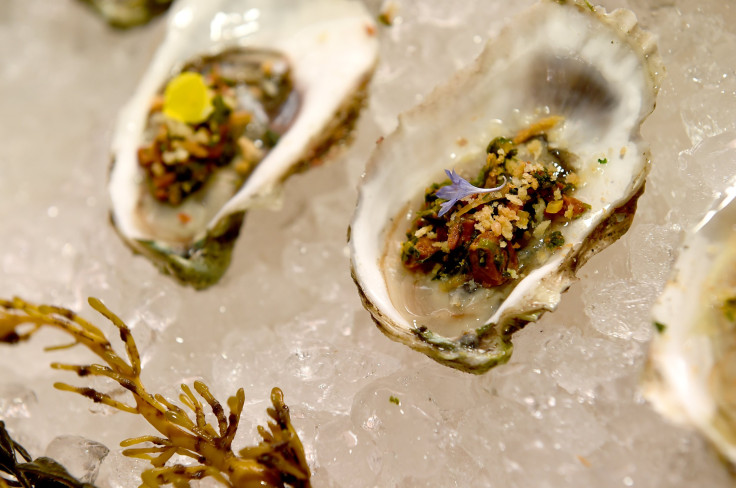This Thanksgiving Dinner, Avoid These Foods To Stay Healthy

Every year, about 48 million Americans get sick from eating something. Most of them suffer a bad night with more visits to the bathroom than you could shake a stick at.
Statistics from the Center for Disease Control and Prevention (CDC) reveal that’s not the case with everyone.
About 128,000 people get hospitalized while about 3,000 people die every year from foodborne diseases. In fact, there are more than 250 different foodborne diseases caused by viruses or bacteria that could affect America’s health.
Thanksgiving, famous for the feast around which the family gathers is also a time when you should be wary about potential foodborne diseases. After all, the variety of food at the table is unparalleled.
So, which foods should you be especially careful about eating this holiday season, and why?
Take a look below.
Raw oysters
Oysters are called filter feeders because they pump water in and out of their bodies. We are talking about gallons of water here and it’s quite natural that in the process, their bodies would accumulate a few bacteria. Some of the bacteria (eg: Vibrio) could make humans sick.
If you are attacked by Vibrio, common symptoms include headaches, chills and nausea.
Another, more hazardous oyster-based problem is the V. vulnificus infection. This is a rarer infection but if you get it, the infection could escalate to blood poisoning and even death. Those suffering from liver conditions, weak immune systems or diabetes are more prone to this type of infection than others.
It’s rare for people to get sick by consuming oysters. But when they do get sick, things could get really nasty and a generally high mortality rate is noted compared to other foodborne illnesses.
To eliminate the bacteria, cooking oysters should do the trick. But if you still want to eat it raw, be aware that Vibrio multiplies in warmer water — meaning, it would be a good idea to ensure that the shellfish you buy come from cold waters.
Incidentally, California bans the sale of raw oysters sourced from the Gulf of Mexico in the warm months that stretch from April to October, unless the oysters get treated using pasteurization-like methods.
Sprouts
Sproutbreaks are more common than you may have thought.
Outbreaks of diseases caused by contaminated sprouts have happened at least once every year for over two decades, as per the CDC. Sprouts, as you know grow in water and bacteria tend to love water. The microscopic beings also have an affection for the nourishing ecosystem that a sprout seed provides. Bacteria like Salmonella, E. coli and Listeria find the seed quite homely.
So, it’s advisable not to indulge too much on raw sprouts this holiday season (or afterwards, for that matter). If you need further prodding to eschew raw sprouts, allow us to remind you about the E.coli outbreak which spread across 16 European countries in 2011. The outbreak which was sprout-based claimed 50 lives.
Ground beef/ chicken
The E.coli bacteria live inside cattle intestines. They may contaminate meat while the cattle is being slaughtered.
Ground meats compound the problem since parts of different animals get mixed together.
With regards to outbreaks born from chicken, the Salmonella bacteria is usually involved. They are usually brought to slaughterhouses by avian birds who are carriers of the bacteria which gets spread to the poultry via their excrement.
Sorting through 12 years of data about 1,700 food-related outbreaks, the Center for Science in Public Interest — a non-profit consumer advocacy group — tried to identify the meat and poultry products which carry the highest risk.
Surprisingly or not, ground beef and chicken came on the top of their list.
Exacerbating the issues with meat and poultry are antibiotics. Heavy use of antibiotics in farms is a well-known issue and that’s not exactly helpful in preventing foodborne illnesses.
Raw milk
Raw milk has its fans, we know. And they claim that it has health benefits that help them ward off a host of ailments, from asthma to allergies.
But the thing to remember is that most of these claims are only anecdotal and not science-backed. It’s also worth remembering the reason milk began to get pasteurized in the first place — so that the pathogens in it which make you sick can be killed.
The fact is that even livestock raised in sanitary conditions could carry harmful germs. As per data from the federal government site Foodsafety.gov, even though just 4 percent of the dairy products used by Americans are unpasteurized, over half of dairy-linked outbreaks come from raw milk products (This estimate is based on a 2006-2007 population survey by FoodNet).
If you get sick from raw milk, the effects could include stomach cramping, vomiting, and diarrhea that may last days. In severe cases, it could lead to chronic disorders, paralysis, kidney failure and sometimes even death.
So, please do eat safe this Thanksgiving, and have a great holiday!
© Copyright IBTimes 2024. All rights reserved.




















